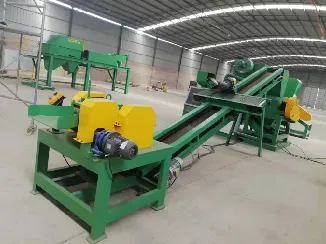

ธ.ค. . 23, 2024 07:08 Back to list
The Essential Role of Shredding Machines for Metal Recycling
In today's world, where sustainability and resource management are becoming increasingly important, the role of shredding machines in metal recycling cannot be overstated. These powerful machines are essential to the efficient processing of scrap metal, enabling the recycling industry to reclaim valuable materials while reducing waste and environmental impact.
What are Shredding Machines?
Shredding machines, often referred to as metal shredders, are industrial machines designed to break down bulky metal objects into smaller, manageable pieces. They operate using rotating blades, hammer mills, or other cutting mechanisms to pulverize metal waste such as scrap vehicles, appliances, and construction materials. The resulting smaller metal fragments are easier to process and transport, making them more amenable for recycling.
The Importance of Recycling Metal
The recycling of metal is vital for several reasons. First, it conserves natural resources. Mining and processing raw metals consume significant energy and water, along with generating greenhouse gas emissions. By recycling, we can reduce the need for new metal production, thus minimizing our environmental footprint. Second, recycling metals helps to reduce waste. Metal products have a long lifespan, and when they reach the end of their use, instead of ending up in landfills, they can be repurposed and given a new life through recycling programs.
How Shredding Machines Enhance Efficiency
Shredding machines significantly enhance the efficiency of metal recycling operations. By breaking down large and unwieldy objects into smaller sizes, shredders make it easier to separate different metals for various recycling processes. The use of shredders also helps reduce transportation costs; smaller metal scraps are cheaper and easier to transport than larger pieces, allowing recycling facilities to operate more economically.
Moreover, advanced shredding technologies can process a wider variety of metals, including ferrous and non-ferrous materials. This flexibility means that recycling facilities can handle different types of scrap, improving their ability to engage with diverse sources of metal waste.

The Technological Advancements in Shredding Machines
Modern shredding machines have seen significant advancements in technology, improving their efficiency and effectiveness. The introduction of computerized controls and automation has allowed for better precision in shredding operations. For instance, sensors can detect the type and thickness of metal being processed, adjusting the machine's operation to optimize output.
Additionally, energy-efficient designs are becoming more common. Manufacturers are creating shredders that consume less power while maintaining high-performance levels, contributing to overall sustainability goals. These innovations not only enhance productivity but also reduce operational costs, making recycling more viable for businesses.
Environmental and Economic Benefits
The recycling of metals through the use of shredding machines provides both environmental and economic benefits. On the environmental side, recycling metal saves energy and reduces pollution. It is estimated that recycling aluminum saves up to 95% of the energy required to produce aluminum from raw materials.
Economically, metal recycling contributes significantly to the economy, creating jobs and supporting local businesses. Recycling facilities require a skilled workforce to operate shredders and manage the recycling process, meaning that investing in shredding technology can lead to job creation in the community.
Conclusion
In conclusion, shredding machines play a crucial role in the metal recycling industry, providing the means to efficiently process metal waste while promoting sustainability. As we continue to recognize the importance of recycling in conserving resources and reducing environmental impact, the demand for advanced shredding technology will likely increase. Investing in such machinery is not just an economic decision but a commitment to a more sustainable future, making it an essential aspect of modern waste management strategies. By embracing these technologies, we can work towards a circular economy where materials are reused, repurposed, and recycled, reducing our reliance on finite resources and protecting our planet for future generations.
Latest news
Troubleshooting Common Eddy Separator Problems
NewsJul.04,2025
The Role of Metal Recycling Plants in Circular Economy
NewsJul.04,2025
The Impact of Recycling Line Pickers on Waste Management Costs
NewsJul.04,2025
Safety Features Every Metal Shredder Should Have
NewsJul.04,2025
How Industrial Shredders Improve Waste Management Systems
NewsJul.04,2025
How Cable Granulators Contribute to Sustainable Recycling
NewsJul.04,2025